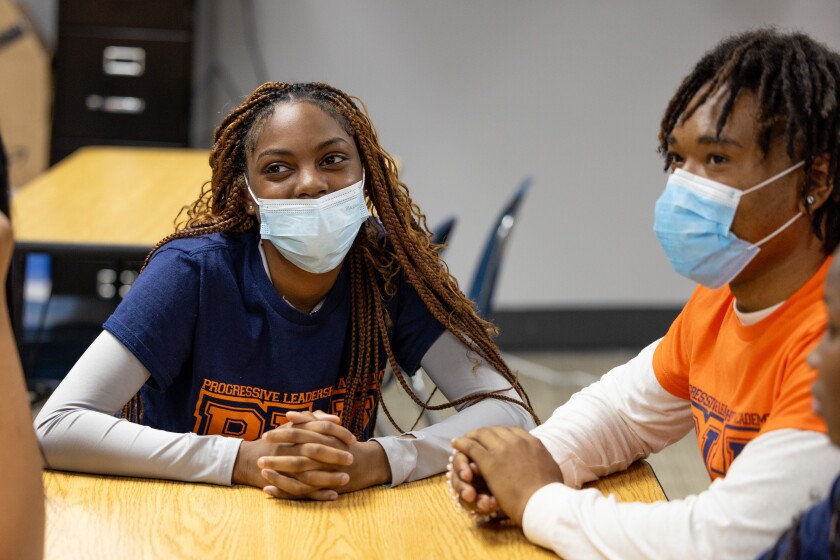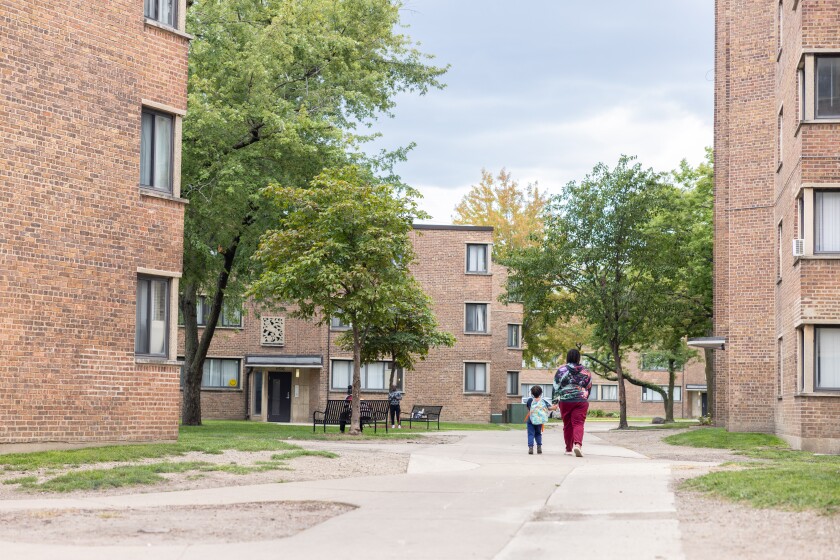Anthony Carter has spent his entire life in one of Chicago’s most dangerous areas.
He now works every day to make his community, known to many as O Block, feel safer.
But he doesn’t want President Donald Trump’s help.
“It’s within us to stop the violence,” Carter says. “President Trump couldn’t do nothing about that.”
Trump has turned his attention toward Chicago this month, calling the city a “killing field” and a “disaster” in need of cleaning up. He’s threatened to send in the National Guard, although violent crime is down citywide.
It’s unclear whether Trump has the legal authority to send troops to the city, where they would go and what they would do.
And while residents like Carter have differing views on how safe the city is, nearly everyone interviewed for this story agreed that federal troops aren’t needed here.
Carter, 44, has spent his whole life in the 6400 block of South Dr. Martin Luther King Jr. Drive. The block is home to the Parkway Gardens low-income apartment complex, commonly known as O Block, a name that has become synonymous with street violence in Chicago.
“When you got neighbors in the worst community in the world saying that they don’t want the federal guards to come, that’s got to be something,” Carter says. “But the internet is producing this is such a bad place to go.”
O block, like the rest of Chicago, has seen a drop in violent crime in recent years.
But since 2010, more people have been shot there than any other block in the city. O Block was named for 20-year-old Odee Perry, a gang member gunned down just around the corner in the summer of 2011.
Since then, the block has gained international notoriety through Perry’s friends, rappers Chief Keef and King Von, who both lived at Parkway Gardens and made frequent references in their music.
King Von, who was killed in 2020, was immortalized in a mural that loomed over the apartment complex from across the street. It was removed last year.
The block’s highest single year for shooting victims came during a spike in 2021 when 22 people were struck by gunfire. But shootings are down, and most residents say they can feel the decrease in violence. So far this year, two people have been shot on the block.
Dennis, 24, who asked to be referred to only by first name, says he lived through the ups and downs of the neighborhood and remembers the block at its worst: “Shootings every day of the week. You wake up, you hear shots, before you go to sleep, you hear shots.”
“Now it’s like, you can wake up, come outside, kids can be outside,” Dennis says. “They ain’t got to run from nobody, chase somebody, shoot nobody. The kids are more safe than they used to be back then.”
On a Wednesday afternoon in late August, the Parkway Gardens complex is full of life. Cars and pedestrians have to pass through a security gate to enter, which many residents think has helped with crime.
Inside the gates, teenagers walk home from school, young kids run after each other and older residents step outside to chat on benches and folding chairs.
Ruby Turner, 66, Darell McCoy, 59, and Earnestine Gardner, 81, gather on what they call the “old school bench.”
“A lot of young people come needing to come sit down and talk to us and stuff,” Turner says. “I talk to them about doing better in their lives, getting their education so they can live and make it.”
“They call it O Block, but it ain’t no O Block to me. It ain’t no jail, it’s still a home,” she says.
While Trump claims to be committed to restoring public safety in Democrat-run cities, Turner and McCoy say he has no interest in actually helping poor Black and brown communities affected by violence.
“He’s trying to take us back, back in the centuries before when Blacks didn’t have no rights,” McCoy says. “Ain’t nobody begging for that man to come nowhere. They’re begging for him to leave and get out of the presidency.”
Gardner worries Trump’s actions wouldn’t just be ineffective, but would actually make crime worse. “It’d be a lot of problems,” Gardner says.
Trump seizes on Chicago’s crime problem
Trump has threatened to deploy federal troops to Chicago, as he’s done in Washington, D.C., as a means of combating what he claims is a surge in violent crime.
Federal immigration agents and possibly National Guard troops would operate out of Naval Station Great Lakes near North Chicago for the next month, as part of Trump’s plan.
Gov. JB Pritzker and Mayor Brandon Johnson stand strongly opposed to any possible deployment of troops, calling it both unlawful and unnecessary, as crime has decreased significantly citywide.
Chicago has seen a 32% decline in homicides, a nearly 33% decline in robberies and a 36% decline in shootings so far this year compared to last, according to Chicago police data.
Trump has recently hedged his threats to send in federal troops, saying he may wait for a request from Pritzker.
“I’m not a dictator, I just know how to stop crime,” Trump said at a televised cabinet meeting. “But [Pritzker] should be calling me and he should be saying, ‘Could you send over the troops, please? It’s out of control.’”
Kids don’t want troops — but they do want change
At Progressive Leadership Academy, an alternative high school next to Parkway Gardens, students say they don’t want to see the National Guard in the streets, but they still want to see something done about the violence.
The students know crime is down, but the city doesn’t feel safer to them.
“Outside of school, there’s not a time when I’m not watching my back,” Charles Pierce, 17, says.
Having police around doesn’t make Pierce and his classmates feel safer. They’re worried that tensions will rise if there’s more law enforcement in the street. Though they were young, they all remember the confrontations that occurred during the George Floyd protests in 2020.
“We need help, but not that type of help,” Pierce says. “A lot of us already don’t trust police as it is. So if military people come in, that’d make it worse, because they’re in the military, and all they do is kill.”
His classmate Miracle Davis, 16, agrees, “It’s not going to turn the violence down; it’s going to bring it back up.”
If Trump wants to help address violence in Chicago, Da’mari Hayes, 16, says he should look to its root causes.
“Only thing people out here need is a little bit of help,” Hayes says. “You’re gonna cut crime out with helping the people that’s less fortunate. That’s the only way you’re gonna do that without causing more crime and more pain and more suffering.”
Maya Thompson, 16, says that help could come in the form of mentoring and jobs.
“The money that Trump is using to bring the National Guard here, he should use it to make more activities and more programs,” Thompson says. “And then he should use it to give us better job opportunities. … That would help with safety.”
Pastor welcomes National Guard
Pastor Corey Brooks and his organization, Project H.O.O.D., have helped bring youth programming and resources to the Parkway Gardens community. His church, New Beginnings Church of Chicago, is at 66th and King Drive, and he’s currently constructing a massive community center right across the street.
He spent almost a year sleeping on the roof of the church to raise funds to build the Leadership & Economic Opportunity Center.
Unlike area residents, Brooks, an outspoken Republican, says he supports bringing the National Guard to Chicago.
“I think that crime is so bad that we need to get a handle on it and calm it down,” Brooks says. “However, I do believe that the National Guard is a temporary solution. More permanent solutions come from organizations like ours.
“I believe that, because the National Guard can stand on corners, but it’s institutions like ours that stand in the lives of people.”
Carter, the lifelong resident, has worked at Project H.O.O.D. for the past four years. He says he owes the organization “everything under the sun.”
“Without them, I don’t know where I’d be in the world right now,” he says. “It came to my mind that it was time for me to get myself together. … I owe it all to Project H.O.O.D.”
Carter is hopeful the new center will help more area residents break through the cycle of violence.
“In this city, we need more opportunity, more things to do, more things to do for the youth, jobs for the youth,” Carter says. “It’s all about money. If they had something to do, then it wouldn’t be no time for no chaos.”
Source link




